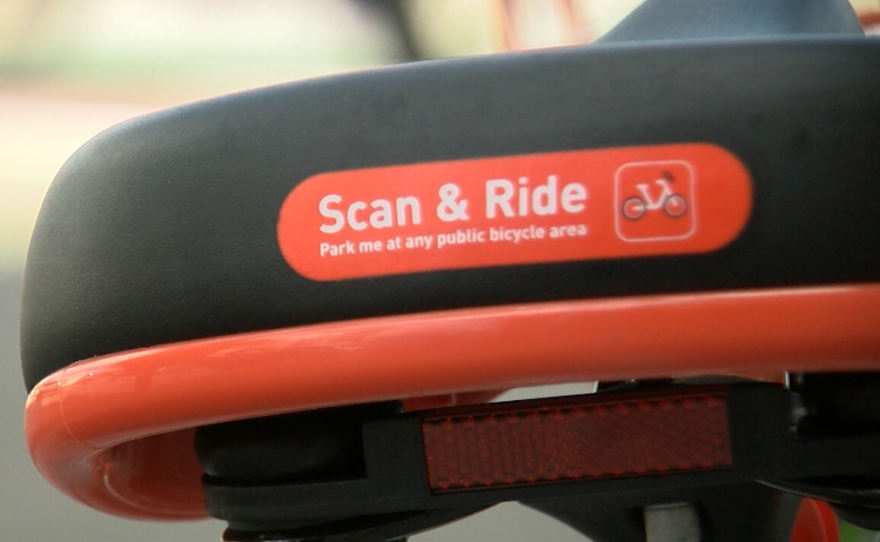As the boom in dockless bike and scooter sharing in San Diego subsides, the handful of companies behind the disruptive technology are starting to refine where their vehicles can be used. And while skeptical residents and businesses may welcome the companies' self-imposed limitations, others see the shift as cause for concern.
Mobike recently implemented a "core operating area" that covers parts of downtown, Hillcrest, North Park and the Midway District. Users who leave the orange bikes outside that zone can be charged a "bike relocation fee" of $5. The company has also banned parking in Balboa Park, warning riders that violations could affect their future usage of Mobike.
Despite the new restrictions and bike relocation fees, the Mobike app still shows dozens of the company's bikes clustered in neighborhoods outside its core operating area, including Balboa Park, Barrio Logan, Logan Heights and Pacific Beach. The company did not respond to a request for an interview about the policy change.
None of the dockless companies in San Diego has gone quite as far as Mobike, however. Rival bike-sharing company ofo has also implemented a limited service area, though it covers virtually all San Diego neighborhoods. Bird does not warn users of any service area limits within San Diego, but the company does not appear to routinely place its electric scooters in neighborhoods east of the SR-15 freeway. A company spokesman said via email that the scooters are placed in areas with the highest demand.
RELATED: Little Italy Association Is Evicting Dockless Bike Sharing
Users of Lime, which offers bikes and electric scooters, may have noticed recent notifications in the app saying their neighborhood is an "unserviced area." Company spokesman Gene Kim said the notifications were an error that engineers were working to correct, and that currently no San Diego neighborhoods are excluded from its service.
Spin has always operated exclusively on the UC San Diego campus. All the companies allow users to rent their vehicles via a smartphone app.
Unlike Coronado, which has banned storing shared bikes and scooters on the public right-of-way, San Diego allows their use throughout the city as long as they are ridden safely and legally and are not parked blocking sidewalks or curb ramps.
Beryl Forman, marketing and mobility coordinator for the El Cajon Boulevard Business Improvement Association, has been among the new technology's greatest cheerleaders. The business group has organized group rides on the dockless bikes, and has an ofo bike displayed prominently in its office window.
But Forman said companies cutting off service to certain neighborhoods would be a disappointment, particularly if the excluded areas were low-income.
"I overall thought that the business model of dockless bikes was that it doesn't have boundaries, and should be able to perform for everybody," she said. "So setting boundaries is a real setback."
RELATED: City Heights Embraces Dockless Bikes While Other Communities Fight Them
She added that low-income residents are less likely to own cars, and could benefit from a more affordable transportation option.
"Excluding a neighborhood that is reliant on these alternative forms of transportation is absolutely an equity concern," Forman said.
Environmental activists have embraced dockless bike- and scooter-sharing as a game-changing technology that could help San Diego meet its ambitious climate change goals, which rely heavily on shifting people's commutes away from cars. But new limits to service areas in San Diego reveal a basic fact about the startup companies: They are private, for-profit businesses that are likely to gravitate toward areas they see as most lucrative.
City Council members last month began discussing potential regulations for bike- and scooter-sharing companies, though no concrete proposals have yet materialized since the council rejected a ban on electric scooters on the boardwalk from Mission Beach to La Jolla. Councilwoman Lorie Zapf, who had proposed the ban, argued it was necessary to protect pedestrians from reckless riders.
Maya Rosas, director of policy for the nonprofit Circulate San Diego, said city officials should work to ensure the technology is accessible to everyone.
"This is why the city of San Diego needs to implement smart regulations that encourage the use of dockless transportation," Rosas said. "And that means not banning bikes in certain areas, and also making sure that the bikes and scooters are available in all neighborhoods."






